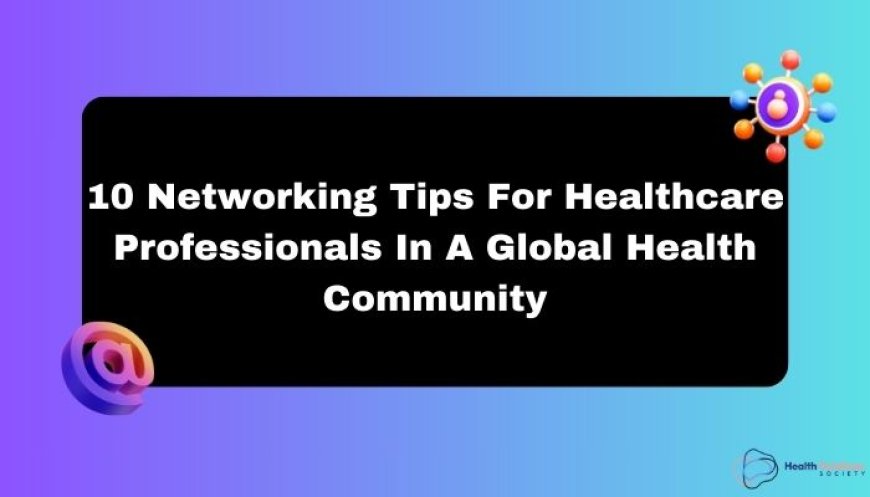10 Networking Tips For Healthcare Professionals In A Global Health Community
10 practical networking tips for healthcare professionals to enter a global health community successfully.

In the rapidly evolving healthcare landscape, networking has become a cornerstone for professionals seeking to make a meaningful impact. With the increasing complexity of global health challenges, collaboration and knowledge sharing have never been more essential. By building strong relationships and expanding their professional network, healthcare professionals can access valuable resources, collaborate on innovative projects, and drive positive change in the field.
The article offers 10 essential networking tips to help individuals navigate the global health community and achieve their professional goals.
Define Your Goals And Target Audience
Before diving into networking, it's crucial to have a clear understanding of your objectives. What do you hope to achieve through networking? Are you looking to:
-
Find a new job in a specific field or organization?
-
Collaborate on research projects with other professionals?
-
Broaden your knowledge base by learning from others?
-
Build your reputation as an expert in your field?
-
Identify potential mentors or mentees?
Once you've identified your goals, you can tailor your networking efforts to reach the right audience. For example, if you're looking to find a new job in public health, you should focus on networking with professionals in that field. Similarly, if you're interested in collaborating on research projects, you should seek out individuals or organizations with complementary expertise.
Leverage Online Platforms & Social Media
In the digital age, dynamic online platforms and social media have become powerful tools for networking. Join relevant online communities such as professional groups, forums, and discussion boards. Take part in discussions and share your expertise to identify yourself as a thought leader in your field.
LinkedIn is particularly valuable for healthcare professionals. Create a strong LinkedIn profile highlighting your skills, experience, and accomplishments. Connect with colleagues, former classmates, and other professionals in your network. Join industry relevant groups and participate in discussions to expand your reach and build relationships. Additionally, some healthcare networks like the Health FutuNear Society have community interaction features for their members to connect and collaborate.
Attend Conferences And Industry Events
Conferences and industry events offer excellent opportunities to meet like-minded professionals, discover the latest trends in healthcare, and explore evolving healthcare services. Attend sessions that meet with your interest areas and participate in networking events such as cocktail parties, receptions, and roundtable discussions.
Exchange business cards with potential contacts and follow up with them after the event. This will help you maintain your connections and build stronger relationships.
Join Professional Organizations
Membership in professional organizations can offer valuable networking events, access to resources, and opportunities for professional development. Look for organizations that cater to your specific area of expertise, such as the American Medical Association, the American Nurses Association, or the American Dental Association (ADA).
Actively participate in their events and activities to link with other professionals, learn about the latest trends in your field, and stay up-to-date on industry news. Many professional organizations offer continuing education courses, conferences, and webinars that can help you advance your career.
Volunteer Your Time
Volunteering is an excellent way to give back to the community, connect with new people, and gain valuable experience. Look for volunteer opportunities that meet with your interests and allow you to contribute to healthcare initiatives. This could involve volunteering at a local hospital, clinic, or community health center.
Volunteering can also aid you build your network by helping you meet with like-minded individuals who share your passion for healthcare. You may also have the opportunity to develop new skills and gain leadership experience.
Seek Mentorship And Offer Guidance
Mentorship can offer invaluable guidance and support as you explore your career. Seek out mentors who can give out advice, share their experiences, and help you meet your goals. A mentor can also provide valuable insights into the healthcare industry and help you develop your professional network.
Additionally, consider offering mentorship to others. This can strengthen your relationships, enhance your own professional development, and give back to the community. Mentoring can also be a rewarding experience that can help you build your leadership skills and give back to the next generation of healthcare professionals.
Network With Colleagues And Former Employers
Don't overlook the power of your existing network. Your colleagues, former employers, and classmates can be valuable resources for networking. Reach out to them and let them know about your career goals. They may be able to connect you with valuable contacts or provide advice based on their own experiences.
Maintain your relationships with these individuals even after you've moved on from a job or organization. Stay in their touch via email, social media, or by attending industry events. Your current network can be a valuable asset as you continue to advance your career.
Attend Industry-Specific Meetups And Workshops
Meetups and workshops provide opportunities to connect with professionals who share your interests. Look for events in your area or online that focus on specific topics or areas of healthcare. These events can be an excellent way to meet new people, learn about the current trends in your field, and expand your network.
Many professional organizations host meetups and workshops. You can also find events through online platforms.
Follow Up And Maintain Relationships
After networking events, be sure to follow up with new contacts. Send a personalized email or message to acknowledge them for their time and express your interest in staying connected. This will aid you build stronger relationships and maintain your connections over time.
Building and maintaining long-lasting relationships is key to successful networking. Stay in touch with your contacts by attending industry events, connecting on social media, or reaching out to them periodically.
Be Authentic And Genuine
The most effective networking is based on genuine connections. Be yourself, show interest in others, and be authentic in your interactions. People are more likely to want to connect with you if you come across as genuine and approachable.
Avoid being overly salesy or self-promotional. Instead, focus on creating relationships and helping others. By being authentic, you'll create stronger connections and establish yourself as a valuable member of the healthcare community.
The Benefits Of Exposure To Diverse Healthcare Stakeholders
Exposure to a diverse range of healthcare stakeholders within a professional network can significantly broaden your experience in the field and facilitate personal growth. When you interact with professionals from different backgrounds, specialties, and perspectives, you gain a deeper understanding of the novel healthcare solutions, landscape, and the challenges it faces.
Here are some key benefits of exposure to diverse healthcare stakeholders:
-
Enhanced understanding of different perspectives: By interacting with professionals from various backgrounds, you can gain valuable insights into different perspectives on healthcare issues. This can help you build a more nuanced understanding of intrinsic problems and find innovative solutions.
-
Increased cultural competence: Exposure to diverse healthcare stakeholders can help you develop cultural competence, which is critical for delivering effective care to patients from different backgrounds. Understanding cultural differences can aid you communicate more effectively with patients and their families, build trust, and provide culturally sensitive care.
-
Expanded professional network: Connecting with professionals from diverse backgrounds can help you expand your professional network and create new opportunities for collaboration. A diverse network can provide access to valuable resources, mentorship, and job opportunities.
-
Improved problem-solving skills: Exposure to diverse perspectives can help you develop stronger problem-solving skills. When faced with complications, you can draw on the insights and experiences of others to find innovative solutions.
-
Increased creativity: A diverse network can stimulate creativity and innovation. By interacting with professionals from varied backgrounds, you can be exposed to novel ideas and approaches that can help you think outside the box.
-
Enhanced leadership skills: Exposure to diverse healthcare stakeholders can help you develop stronger leadership skills. When you're able to work effectively with people from different backgrounds, you can build consensus, inspire others, and drive positive change.
Exposure to diverse healthcare stakeholders is essential for broadening your experience in the field and facilitating personal growth. By building strong relationships with professionals from different backgrounds, you can gain valuable insights, develop cultural competence, expand your network, improve your problem-solving skills, and enhance your leadership abilities.
Bottom Line
Networking is a valuable skill for healthcare professionals seeking to grow in their careers and contribute to the global health community. By following these tips and actively building your network, you can create meaningful connections, access new opportunities, and make a positive impact in the healthcare landscape. Remember, networking is an ongoing process; therefore, it is imperative to invest time and effort continuously in building and maintaining your relationships.
What's Your Reaction?




























































:strip_icc():format(webp)/kly-media-production/medias/5082523/original/082651200_1736234619-patrick.jpg)















































